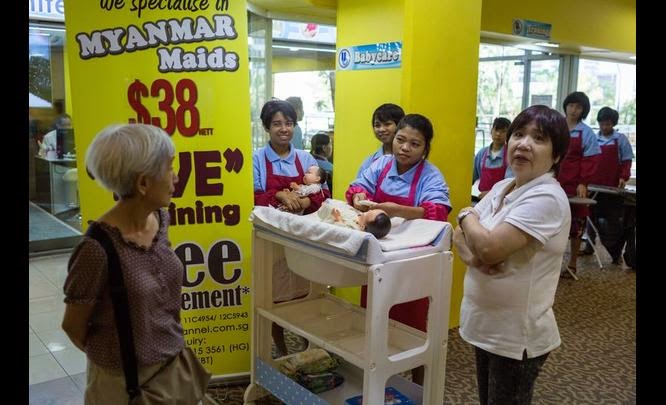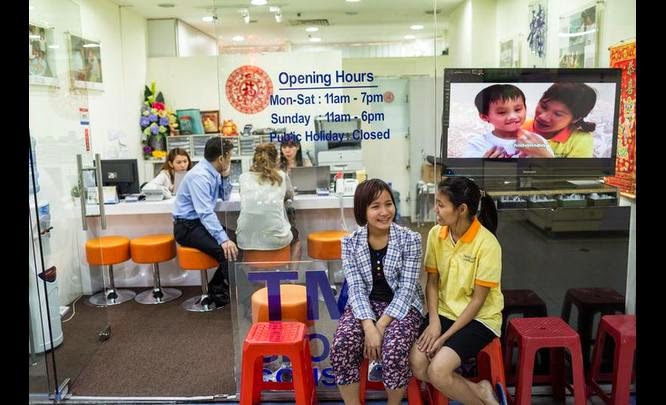push each other around in wheelchairs, as though they’re taking care of the
elderly…..In another gallery, a woman cradles a baby doll and pretends to change
its diapers..…Istiana,
an Indonesian domestic worker in
Singapore…..”Those signs that say ‘cheap price’ and ‘discount maid’. But
these are people”….
…………………
It is quite a common practice in barbarian lands however you have to appreciate the grace and elan with which such activities are packaged in the free world. Complete with banners and posters..it is a worship of freedom, really. You are eligible to get a discount on human beings…because their humanity is not fully assured.
….
Also for those who would blame it on market forces gone wild, remember this. In Singapore you are not even allowed to spit on your own hands without prior govt permission (application in triplicate to the Ministry of Good Behavior).
……………
Go to the Bukit Timah Shopping Centre, a
1970s mall in central Singapore, and you will find five levels of brightly lit
rooms and galleries called “Homekeeper” and “Budget Maid”.
Inside these rooms, dozens of women sit in a listless, artificial silence. They
nod respectfully as you enter, and some watch closely as you speak to staff.
You might take one home with you – for two years, or longer.
…
The women, domestic workers, come from
Indonesia, the Philippines, and Myanmar. They sit beneath garish signs and
posters, testifying to their friendliness and industriousness, or advertising
“super promo” rates and “special discounts”.
…
Some “maid agencies”, as they’re
known locally, display women at work. Along one aisle, domestic workers
push each other around in wheelchairs, as though they’re taking care of the
elderly. In another gallery, a woman cradles a baby doll and pretends to change
its diapers. Others stand in mock living rooms ironing the same shirt, or
making the same bed – scenes enacted elsewhere in Singapore at malls like
Katong Shopping Centre on Mountbatten Road.
…
Jolovan Wham, executive director of the
Humanitarian Organisation of Migration Economics (HOME), a migrant workers
advocacy group based in Singapore, said that some agencies market their
domestic workers like “commodities”. He adds that racial stereotypes
are sometimes used in transactions with patrons. “Some of the stereotypes
include Filipinos as ‘smarter’, Indonesians as ‘less bright’ and Burmese as
‘sweet-natured and compliant’.”
…
There have also been complaints of women
being underfed at certain employment agencies, according to Ummai Ummairoh, president of the Indonesian Family Network
(IFN). “We always receive calls about agencies not giving enough food. In
one case, an agency was spending $20 to feed 40 people.”
Ummairoh, who also worked as a maid, added
that the shopping centres made women look like “dolls at a
supermarket”.
…
For Anandha Nurul, a domestic worker who
spent seven years in Singapore, her time at the shopping malls was marked by
boredom and long hours. “They did not treat me very nicely,” she
said, recalling that she was fed instant noodles for the three days she was at
her agency. “We didn’t even boil the noodles properly. We just used warm
water.”
…
But standards vary considerably within the
industry, and other agencies claim to afford female domestic workers more
dignified conditions. “We should be fair and treat these workers as human
beings,” said Dawn Sng of PrimeChoice Maid Agency, who claims that her agency
provides domestic workers with in-house training, free meals, and counselling.
“We should not put them into a lower category of people.”
…
Bukit Timah and other shopping centres like
it are the culmination of networks and organisations extending from Singapore
to various parts of Southeast Asia: from brokers who recruit women from poor
countries, to training centres that prepare women for life abroad, to
“runners” who ferry domestic workers from airports to shopping
centres, and finally to the employment agencies themselves, of which there are
hundreds in Singapore, competing in what is effectively a multimillion dollar
industry. Wham says that there are currently 215,000 domestic workers in
Singapore.
For most women, according to Wham, the
shopping centres are fleeting experiences that last no longer than a
week. Before coming to Singapore, most domestic workers have already found
their employers after a phone or webcam interview from their home countries. The
malls are essentially transition points, and the women are soon sent to their
employers after completing a “settling-in programme” and a mandatory
heath check.
..
But some maids return to the malls and can
end up staying there for as long as a month. In the language of employment
agencies, these women are “transfer maids”, and have either been
released by their original employers, or have requested to leave after
experiencing problems at work.
…
Shelley Thio, executive member of Transient
Workers Count Too (TWC2), attributes most problems to “working
conditions”, and cites verbal abuse, non-payment of wages, and excessive
work hours as among the most common reasons domestic workers request formal
transfers.
…
Thio also raised concerns over Singapore’s
“live-in” requirement, by which a full-time domestic worker is
legally obliged to live in the home of her employer.
…
“We
have continually advocated that the live-in requirement is unsatisfactory
because it easily leads to abuse,” Thio said, adding that some women
become vulnerable because of the removal of mobile phones, which isolates them
from friends and organisations such as HOME and TWC2.
…
The live-in requirement can leave women
vulnerable to sexual abuse. Earlier this year, a Cambodian domestic worker was
sexually harassed by her employer’s father, with whom she was made to share a
room. Although the woman had complained about this arrangement, both to her
employers and employment agency, nothing was done to change her situation prior
to the abuse.
….
Problems in Singapore are sometimes
compounded by unscrupulous practises and weak oversight in the female workers’
underdeveloped home countries. In Indonesian training centres, for instance,
women commonly complain that dormitories are overcrowded and that they are not
given enough food, according to Wahyu Susilo of the advocacy group Migrant
Care.
…
“We are always finding migrant workers
in cramped rooms and living with poor sanitary conditions. In one case we found
200 migrant workers sharing two or three toilets.”
…
He adds that monitoring by the Indonesian
government is generally weak, which has led to exploitative conditions at a
number of centres, including unreasonable fees and deceptive recruitment
practises.
…
In some cases, monitoring of training centres
in originating countries is limited due to corruption. According to the
managing director of one centre in Indonesia, who spoke to Al Jazeera on the
condition of anonymity, local police accept bribes from the training centres
they are tasked with inspecting.
…
Most domestic workers who come to Singapore
have large debts in the form of placement fees paid to agencies as monthly
salary deductions.
..
Thio at TWC2 said that she has come
across instances where domestic workers end up owing $4,500 to their agencies,
adding that the average debts women accumulate are between $2,500 and $3,000.
“High placement fees are charged to the
worker because the agencies can get away with it,” according to Wham, who
said that some agencies disguise these fees as “loans”.
…
“The worker pays these fees because she
feels that she doesn’t have a choice. And our laws do not make it mandatory for
employers to bear the bulk of the fees.”
…
Some domestic maids also work in Singapore
illegally. A number of women are employed even though they are underage,
according to Thio, and some will be brought into the country under conditions
indicative of trafficking.
…
But at shopping centres, where clients stroll
past “Homekeeper” and “Budget Maid”, and where domestic
workers continue their unending simulation of household work, little of this is
expressed or known.
“I
watched all those things”, recounts Istiana, an Indonesian domestic worker
who has recently come to work in Singapore. “Those signs that say ‘cheap
price’ and ‘discount maid’. But these are people,” she added.
…..
…..
regards


